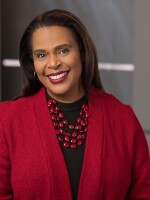The Howard Gardner School in Alexandria, Virginia, is one of many small, independent schools in the area. With intentionally small enrollment, they seek to help each student discover the ways in which they are intelligent. Based, in part, on the Theory of Multiple Intelligences, put forth by Harvard psychologist Howard Gardner, the school welcomes many different kinds of “brains” and emphasizes both diversity and collaborative learning, often for students who have had difficulty in more traditional settings.
TRANSCRIPT
Natalie Shapiro: It's not that something is wrong with me. It's that I have different ways of learning that aren't suitable for certain schools but here they taught me that everyone is different. Everyone learns in different ways and that can be accommodated for. [Teacher] So now you're working on various methods, right? Why would this potentially possibly work? I have to be able to explain this.
Erick Johnson: The Howard Gardner school was founded by Katherine Keith and Emily Pavot and Addison Helmke. This school was not named The Howard Gardner School in the first year. So it was named the Transitional School, kind of a terrible name. And the students realized that very, very quickly. And they said, well, you know, this place is about different kinds of brains coming together and being more than the, than the sum of their parts. And there's, there's a psychologist that they had been learning about in their psychology class, and that's Dr. Gardner, Dr. Howard Gardner. The theory of multiple intelligence is is best defined by Dr. Gardner's quote, which says, "it's not how smart are you but how are you smart?"
Michael Petrilli: The classes are smaller. So you don't have to compete to say things in class. And they still teach it pretty. They teach things hands on, but it's kind of laid back. So you have more comfortability in the classroom.
Madison Brown: My freshman year, I was in public school and I felt like I didn't get what I needed because I wasn't really doing what I needed to do. And then when I came here it was like, oh wow, it's different. The structure's different. The learning's different. The teaching's different. You more have a bond. And then it's like, they're hands on. You're like you got it. And I believed in myself that I can really do it. And now I think that I can do it.
Erick Johnson: There are no simple problems left in the 21st century. There are only complex problems. And so a team in order to be as effective as possible needs to be intentionally diverse, not out of some sense of, because that's good or ethical, but because it's powerful. Diversity in and of itself is a force multiplier.
Jeremiah Long: I ended up coming back here, because sometime in college I saw a need for not only Black educators but also I'm passionate because I love to teach people the things that I was not taught. Right, I'm passionate because I I love to see students come up with that, like, oh I never even thought of that before. Right, it's like, oh, that's incredible. I never saw myself in this light. I never saw my friends like this.
Evan Devereux: I remember after being here for the first two weeks with all the interactive activities that we get to do and how engaging the teachers are, you wake up every morning, you're like sweet, I get to go to this school, which makes it so much better than anything you could possibly think of.



